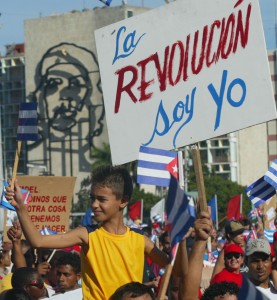La Revolución
March 2, 2012 by alcrook
Although the Cuban Revolution began with the 26th of July movement in 1953, finally overthrowing the Batista government on January 1, 1959, the revolution is far from over. In fact, today Cubans still speak of their support (or lack thereof) for the current system under which Cuba is operating as support for “la Revolución.” The ongoing use of this word is interesting, and I think that it has some profound effects on the psyches of Cubans.
In the United States, we refer to the American Revolution as a brief period of time that specifically involved fighting with the British and ending more or less with the ceasing of fighting and the Treaty of Paris in 1783. Although we are clearly no longer under British rule and have continued our experiment of representational government, it would sound absurd to refer to our current government as “the revolution.” The term’s ongoing use in Cuba is distinctly Cuban and its definition implies many things.
First, the use of the world revolution implies something new, something revolutionary, there was something that came before the revolution, that it has sought to change. This serves as a constant reminder of the widespread lack of support the oppressive, and often violent, Batista and preceding regimes had in Cuba preceding the Revolution. Even though there may be disagreements over some of the government’s policies, Cubans are still able to rally behind “the Revolution” because it is a reminder that it is still an improvement from the rural and urban warfare in Cuba in the early 1900s. This also demonstrates that the term Revolution is a cause that is too a great extent independent of the government. It allows for criticism of the government, while still backing the principles which it stands on, the principles of the Revolution.
Implicit in the idea of something new is the idea of change. And so the Revolution by definition has an element of change. The term itself has also changed in what it has come to mean for Cuba. As the revolution has moved on, its ideology has had to make concessions and adaptions with the times and the circumstances, whether it arises out of the economic crisis of the Special Period or out of an obligation to the alliance with the Soviet Union. The ambiguity of the term allows it to do so and continuously do so while still relying on fundament principles of equality for all and empowerment to the common man that the Revolution depended on.
The revolutionaries of the ‘50s could not have known how long the Revolution would last or the changes it would have to endure and adapt to in light of modern problems. There could not have known that the revolution in Cuban would live on for over 50 years and that “la revolución” would be as much of a cause to rally behind today as it was then.
Sweig, Julia E. Cuba: What Everyone Needs to Know. Oxford: Oxford UP, 2009. Print.
Image Source:
http://www.theprisma.co.uk/es/2011/05/01/el-milagro-cubano-toda-una-realidad/
Leave a Reply
You must be logged in to post a comment.
